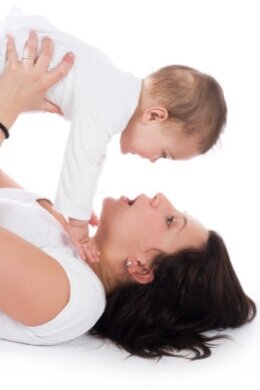How To Talk to Your Baby
In the First Several Months
Hold your baby close. His eyes can focus on objects about eight inches from his face - the distance between your face and his face when holding him in your arms.
Talk softly, whisper, talk normally. Sing him lullabies. Say ohh and ahh to him.
Smile.
Tell him what you see. Talk about his pretty little face, his tiny hands and toes.
Tell him where he is. Talk about him nursing or about him drinking from his bottle.
Repeat the little noises that he makes with his throat and mouth. Let him watch and listen as you play with your own voice.
Talk to him about the things you're doing.
from 4 to 6 months
At about two to four months you'll begin to hear some vowels sounds.
Imitate his vocalizations.
You may even hear an accidental k sound... imitate it when you hear it from your infant. Let him watch you play with the p, b and m sounds. Say the p slowly, produce the b slowly. Exaggerate it. Let him watch. Make the m sound. Some of the first speech sounds are those that he can see you make - your baby can see you bring your lips together when you say the p, b and m sounds.
Not too surprising either that we've selected an easy "visible" word to represent that person with whom he spends so much time in his first several months ma-ma.
Imitate his cooing and squealing. Laugh when he laughs. And when he cries talk calmly and softly to comfort him.
It's never too early to start looking at books with your child. Hold him in your lap and talk about the pictures. If you see a car in the book, talk about your own car; if you see an orange, talk about the oranges in the fruit basket in your own kitchen.
From 6 to 12 Months
From about six months you'll hear lots of vocalizations. Imitate what he says. Or pretend you understand and respond to him.
Your baby's vocalizations now have a purpose. He's requesting a person, an object or an action. Or he's commenting on what is around him. So if his babbling has sounds that just might represent something in the immediate environment, respond using that real word.
So if you hear your baby say babababa, you should respond with The ball! Here's the ball.
You'll notice that you may just naturally respond to your baby by talking with a higher pitch in simple shorter sentences.
Making your speech more sing-song and rhythmic will keep your baby interested.
Slower speech also aids in the language learning process. Use simple grammar forms and stress important words. Using this style of speech, called child directed speech, will provide lots of opportunities for your child to learn the language.
Make book reading a pleasant experience. Snuggle with your little one; label the pictures and talk about them. He'll begin to recognize the names of family members so take advantage of the family photo album. After his first birthday he'll point to pictures when named.
Learn more about Language Development Milestones.
If you feel that your child is not developing language or you fear that s/he is not at the same level as kids his own age, talk to your pediatrician or Call Us.
We’re here to help because we care!



